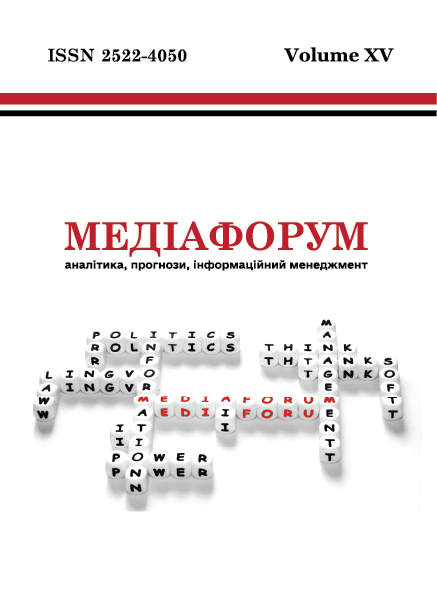Opposition Rhetoric in the Information Space of Moldova (March‒April 2023)
DOI:
https://doi.org/10.31861/mediaforum.2024.15.337-349Keywords:
information space, manipulation, lies, narratives, propaganda, zombification of consciousness, psychological operationsAbstract
The article is devoted to the problem of studying the Moldovan information space and leading media, as well as narratives of Russian propaganda, which are spread through mass communication and new media (telegram channels) by Moldovan propagandists. The review and analysis of the articles of the leading channels of Moldova aims to distinguish the tone of rhetoric and the main narratives spread by various political forces, as well as the propaganda of Russian propagandists in the virtual space of pro-Russian media regarding Ukrainians, Ukraine and the Russian-Ukrainian war.
The purpose of the article is to investigate and distinguish the thematic areas of the leading Moldovan media, to investigate the rhetoric and tone of the materials of the articles.
Research methodology: the article uses a set of general and special methods: the method of conceptual analysis in determining individual narratives that are present in the articles of Moldovan propaganda telegram channels; a comparative analysis in identifying the narratives spread by Moldovan and Russian propagandists regarding the image of Ukrainians, Ukraine and the Russian-Ukrainian war among ordinary citizens of Moldova, as well as a synthesis in identifying thematic models of the Moldovan information space. Distortion of facts, excessive emotionality, condemnation of everything Ukrainian in the pro-Russian Moldovan media are studied by the author in a scientific article.
Results and conclusions. The general characteristics of the information space of Moldova touch on thematic areas important for the state: the security situation of Moldova, the official language, foreign and domestic policies, the government vs. the opposition, the economy of the state, benefits for the population and social protection, the Russian-Ukrainian war, the Transnistrian region.
Telegram channels of Moldova, which have a Russian orientation, spread outright lies about Ukrainians and the Russian-Ukrainian war. The articles and messages of these telegram channels contain narratives that have a negative propaganda character and create a negative image of Ukraine and Ukrainians in the minds of the channel̓̓̓̓̓̓’s readers. The manipulative materials about Ukraine, Ukrainians, the Armed Forces, Ukrainian soldiers, and Ukrainian politicians of these telegram channels have negative images that subconsciously affect the average subscribers of this channel.
Downloads
References
Blyzniuk, A. Hibrydna viina ХХІ stolittia. Рropahanda yak osnovna skladova u politychnykh, sotsialnykh ta etnichnykh protystoianniakh. Intermarum. URL: http://intermarum.zu.edu.ua/article/view/90593/86502. (in Ukraine).
Didenko, M. Informatsiino-psykholohichnyi vplyv na liudei pid chas viiny. Visnyk studentskoho naukovoho tovarystva DonNU imeni Vasylia Stusa. URL: https://jvestnik-sss.donnu.edu.ua/article/view/12102. (in Ukraine).
Dodon, Ihor. Znyshchennia svobody slova v kraini. https://t.me/rusputnikmd/42176. (in Ukraine).
Hibrydna viina u suchasnomu sviti. Shcho pro nei povynen znaty zhurnalist i redaktor? DSpace. URL: https://enpuir.npu.edu.ua/bitstream/handle/123456 789/25597/Kulias%2012-27.pdf?sequence=1. (in Ukraine).
Iryna Vlakh zvynuvachuie Maiiu Sandu. URL: https://t.me/dmoldova/6891. (in Ukraine).
Kobilnyk, B.; Hizun A. Rol informatsiino-psykholohichnykh vplyviv u informatsiinii viini. CORE. URL: https://core.ac.uk/download/pdf/84825493.pdf (in Ukraine).
Prydnistrovets. URL: https://t.me/rusputnikmd. (in Ukraine).
Suputnyk Moldovy. URL: https://t.me/rusputnikmd (in Ukraine).
«Svynokhokhly», «salo reikha». URL: https://t.me/pridnestrovec/37905. (in Ukraine).
Zaiava Maryny Tauber. URL: https://t.me/dmoldova/6891. (in Ukraine).














